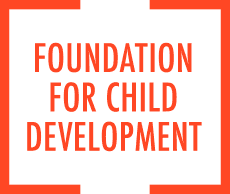Building from the Institute of Medicine and National Research Council Report (IOM/NRC) , “Transforming the Workforce for Children Birth Through Age Eight: A Unifying Foundation,” the Foundation believes that early care and education (ECE) professionals play a critical role in the lives of young children. Those children who are engaged in high-quality early learning experiences have a better chance of developing stronger cognitive, social, and emotional skills than those who are not. Therefore, it’s important to ensure that early care and education professionals have the knowledge, skills, and dispositions necessary to support children and families during the critical years of development from birth through age eight. Highly qualified and well-compensated ECE educators, who are trained to work effectively with diverse populations of children, are essential to ensuring that ECE programs across a variety of settings can help all children succeed in school and in life. ECE educators need to possess the knowledge, skills, and dispositions necessary to:
- Use current science of early learning and development to implement curriculum that is effective for all children;
- Observe, document, and use a range of assessment strategies to understand if children’s learning and development is proceeding within normal expectations; and
- Partner with parents to support children’s development.
Unfortunately, we are not there yet. At a very basic level, we do not have a single, nationally agreed upon set of competencies that define what ECE professionals should know and be able to do. The lack of unified professional competencies, the low pay and benefits, and the fragmented systems of preparation and professional learning have implications for the quality of preparation and practice. These factors have made it difficult for the field to recruit and retain experienced ECE educators.
We believe that strong positive impacts on the lives of young children and their families are dependent upon quality early learning experiences. Therefore, supporting the preparation, well-being, and on-going professional learning of early care and education professionals is essential to enhancing the quality of such experiences for all children.
A stronger workforce is a necessity to ensure that all children, across the birth-through-age-8 continuum, have early educators who are responsive to each child’s learning and developmental needs. By clearly defining a continuum of professional roles, and unifying professional competencies across those roles, by better preparing early educators and providing continual learning opportunities to improve professional practice, and by instituting competitive wages and benefits — a stronger ECE workforce can be reality.
Making this vision a reality will require enhanced federal, state, and local attention and investment to early care and education professionals, institutions of higher education that prepare ECE professionals, ECE programs — many of which are implemented with public funds. In addition, the public also has a role to play to recognize the profession and support increased public supports dedicated to strengthening the workforce. Only through improving and unifying ECE systems which support the preparation, competency, well-being, and on-going professional learning of the ECE workforce will the quality of early learning experiences for young children be ensured.
Two of our grants are helping to achieve this vision. Inspired by the call to action within the IOM/NRC Report to review and define competencies for ECE professionals working across the birth to age continuum. The Foundation supports the National Association for the Education of Young Children’s Power to the Profession initiative to build a coalition of ECE professional organizations to develop a single, nationally agreed upon set of competencies across a continuum of professional roles and levels. Defining what ECE professionals should know and be able to do to support children’s learning and well-being, is the first step.
In the second effort, the Foundation is supporting the Center for the Study of Child Care Employment at the University of California Berkeley to develop the Early Childhood Workforce Index. The Index provides State-by-State data about the status of the early care and education workforce policies and conditions to improve the preparation, ongoing professional learning, effectiveness, and compensation of those engaged in the care and education of young children. Over time progress or lack thereof can be tracked in the Index utilizing indicators related to earnings and economic security, early childhood workforce policies, and family and income support policies.
